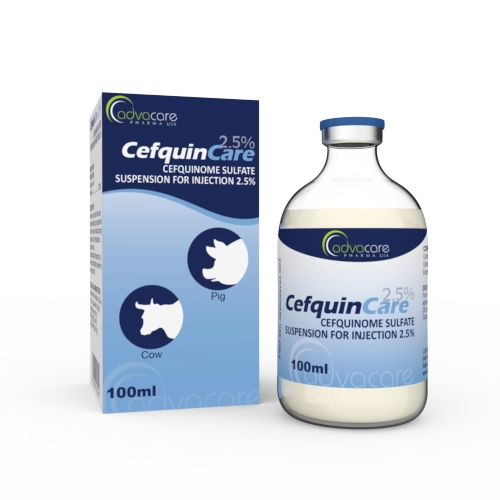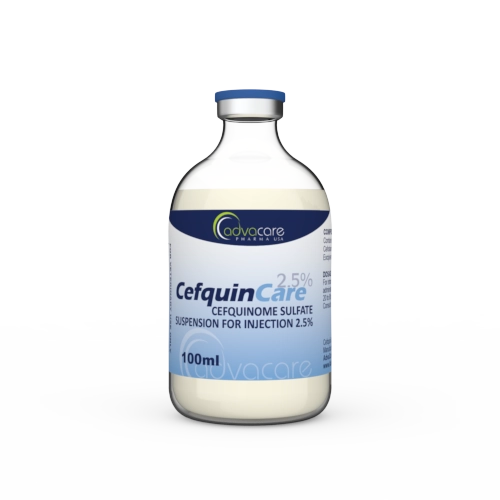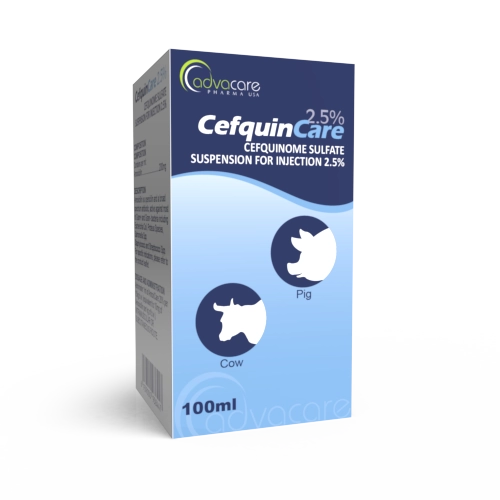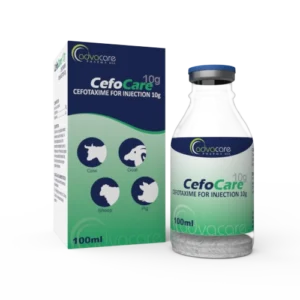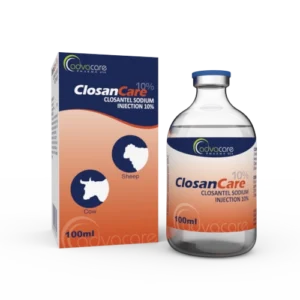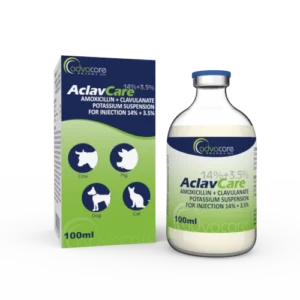What is Cefquinome Sulfate?
- Antibiotic
- Cow,
- Pig
Active Ingredients: Cefquinome Sulfate
Cefquinome Sulfate Suspension for Injection is an antibiotic drug used to treat infections in cows and pigs. It is indicated for mastitis, bovine respiratory disease, shipping fever, zooepidemicus, and other infections. It is sometimes used to treat septicemia in foals but is not recommended for grown horses.
Cefquinome is classified as a semisynthetic fourth-generation cephalosporin. It shows a broad spectrum of activity against both gram-positive and gram-negative bacteria. Cefquinome works by inhibiting cell wall synthesis.
This antibiotic is well absorbed in the animal’s body, with bioavailability ranging from 75% to 90%, although lower bioavailability may occur in older animals. Peak plasma concentrations are typically reached approximately 30 minutes after administration. Once absorbed, the antibiotic distributes widely throughout the body, entering most body fluids and tissues such as kidneys, lungs, joints, soft tissues, bones, pericardial fluid, and the biliary tract. Distribution may be limited in some tissues due to its predominance in the extracellular fluid.
Cefquinome Sulfate belongs to the fourth generation of cephalosporins and can penetrate the blood-brain barrier, making it effective for treating bacterial meningitis. Despite its poor penetration into the cerebrospinal fluid at standard doses, higher doses can facilitate crossing this barrier.
The antibiotic is primarily eliminated renally through a combination of tubular secretion and glomerular filtration. Biliary elimination is also possible. Caution is advised when administering this drug to animals with kidney or liver diseases due to potential complications.
It is important to note that Cefquinome Sulfate Suspension for Injection is intended for animal use only and should be prescribed by veterinary doctors or animal care specialists only. This drug is not approved for human use.
Basil Hygiecare is the manufacturer and exporter of Cefquinome Sulfate Suspension for Injection. We offer a wide range of high-efficacy and cost-effective livestock medications that are available for distribution.
Why are we a quality Cefquinome manufacturer?
Basil Hygiecare is a global supplier and manufacturer of Cefquinome Suspension for Injection for veterinary use. Our wide range of 100+ veterinary injections can be adapted to meet specific market needs, and we offer unrivaled support to veterinary distributors through the entire process – from supply chain coordination to document and registration support. As a reputable Cefquinome manufacturer of veterinary injections, we ensure our production facilities meet strict GMP guidelines so that our livestock medications are reliable and effective.
Precautions
Do NOT use Cefquinome Sulfate Suspension for Injection for an animal that:
- has a known allergy or hypersensitivity to any of the ingredients.
- is hypersensitive to any other beta-lactam antibiotic.
- weighs less than 1.25kg.
Only administer this drug to pregnant or lactating animals if the benefits outweigh the risks. Consult with a veterinarian before you include this antibiotic.
Long-term treatment with this medicine may cause an overgrowth in non-susceptible microorganisms. The duration of the treatment should be determined by a veterinarian.
What are the most common animals Cefquinome Sulfate Suspension for Injection is used for?
Cefquinome Sulfate Suspension for Injection is primarily used for treating bacterial infections in cows and pigs. The specific common uses of Cefquinome Sulfate include the treatment of bacterial infections in the following:
- respiratory tract diseases
- gastrointestinal diseases
- mastitis
Pig Bacterial Infections
This antibiotic in pigs is used for treating various respiratory and gastrointestinal tract diseases. It can also be used for treating mastitis, especially in cases of E. coli.
Cattle Bacterial Infections
Cefquinome Sulfate in cattle can be used for treating respiratory tract diseases. The treatment with this antibiotic should be determined after the antibiogram test is performed.
Veterinarians should decide about the dose and the antibiotic based on the tests from the diagnosis.
Uses
What is Cefquinome Sulfate used for?
It is used to treat bacterial infections such as:
- respiratory tract disease
- zooepidemicus
What animals can be treated with Cefquinome Sulfate Injection?
This medicine is recommended for cows and pigs.
Do not use this drug to treat adult horses.
How is Cefquinome Sulfate Suspension for Injection used?
This medication has been manufactured as a liquid, which is packaged in a vial. It is intended to be administered by intramuscular or subcutaneous injection.
Is Cefquinome Sulfate Suspension for Injection enough for treating secondary bacterial infections during viral outbreaks?
Antibiotics are ineffective against viral infections. Various other drugs, including vitamins, supplements, immune-boosting agents, and specific antiviral medications, are recommended for treating viral infections. However, animals with compromised immune systems are more vulnerable to bacterial infections, increasing the risk of secondary infections. In cases where secondary infections are caused by bacteria susceptible to Cefquinome Sulfate, these medications can aid in managing the illness. Effective treatment should be performed after identification and diagnosis of the present bacteria. Antibiogram testing is recommended to determine appropriate antibiotic therapy.
Does Cefquinome Sulfate Suspension for Injection help in the treatment process of respiratory diseases?
Yes, Cefquinome Sulfate Suspension for Injection helps in the treatment process of respiratory diseases only if the pathogen is bacteria. To determine the treatment procedure, antibiogram testing should be performed.
Can only Cefquinome Sulfate Suspension for Injection help in the treatment procedure of bacterial infections?
It depends on the severity of the case. In some mild cases, only this antibiotic might help. However, very often, animals need additional treatment with various supplements and vitamins.
How does Cefquinome Sulfate Suspension for Injection improve the condition in cases of respiratory diseases?
This antibiotic can improve the clinical signs in cases of respiratory diseases. It can improve the breathing process. In cases of shortness of breath, the condition can be improved immediately. If the patients have an abnormal heart rate, it might be improved if the respiratory disease causes it. Fever and tiredness can also be improved when the disease is managed with this antibiotic.
Can Cefquinome Sulfate Suspension for Injection be used for treating dermatitis and acute mastitis?
Yes, this drug can also be used for treating dermatitis and acute mastitis, especially in cases of E. coli. When the bacteria is susceptible to the antibiotic, the overall milk production and milk quality can be improved.
According to studies, intramuscularly and intramammary cefquinome can lead to high-efficacy cure rates. The conclusion of the study is that clinical coliform mastitis can be cured with this antibiotic. According to other research, mastitis caused by Staphylococcus aureus can also be treated with this antibiotic.
Can Cefquinome Sulfate Suspension for Injection be used for treating puerperal metritis?
Yes, according to studies, this antibiotic can be helpful in the treatment process of puerperal metritis.
How is Cefquinome Sulfate Suspension for Injection administered in animals?
There are two main ways of administering Cefquinome injections in animals, and they include subcutaneous and intramuscular. The choice of administration depends on the veterinarian. Intramuscular injections can be painful for the animal. No matter the way of administration, the plasma concentrations peak at around 30 minutes after injection. When administering, make sure to provide aseptic and sterile conditions. Clean the animal’s coat if it is dirty when applying. Swab the animal’s coat with a high-quality skin antiseptic such as benzalkonium chloride in 70% alcohol, and never apply it to dirty or infected skin.
Can Cefquinome Sulfate Suspension for Injection be used for treating gastrointestinal infections?
Yes, this antibiotic can also be used for treating gastrointestinal infections that are caused by bacteria. If the gastrointestinal infection is caused by a certain parasite or viral agent, the treatment will not be successful. Other drugs and vitamins can also be added and help in the treatment procedure.
How is the dosage for Cefquinome Sulfate determined?
The dosage is usually determined based on the animal’s species, the current health condition, and the animal’s body weight. Owners should consult with veterinarians before giving any dose of the drug to an animal.
What should be done if any side effects arise due to the treatment?
If any side effects arise, they should be reported to a veterinarian as soon as possible. The side effects need to be treated and managed adequately.
How should Cefquinome Sulfate Suspension for Injection be stored?
This medication should be stored in a cool and dark location. The vial should be sealed tightly when not in use.
What is the withdrawal period for Cefquinome Sulfate?
The withdrawal period for meat is 5 days for cattle and 2 days for pigs. For milk, the withdrawal period is 24 hours.
Dosage
How much Cefquinome Sulfate should be given to cattle?
For cows, the usual dose is 1ml/25kg (1mg cefquinome/kg).
How much Cefquinome Sulfate should be given to swine?
For respiratory disease, the usual dose is 1-2ml/25kg (1-2mg cefquinome/kg). For mastitis, metritis, or agalactia syndrome, the usual dose is 2ml/25kg (2mg cefquinome/kg).
Refer to a veterinary doctor or pharmacist for guidelines on dosage.
Side Effects
As with all pharmaceuticals, some unwanted effects can occur from the use of Cefquinome Sulfate Suspension for Injection.
Some common side effects may include but are not limited to localized tissue lesions.
Serious side effects may include allergic reactions (skin rash, fever, facial swelling, or difficulty breathing).
For a comprehensive list of all possible side effects of this medication, consult a veterinarian.
